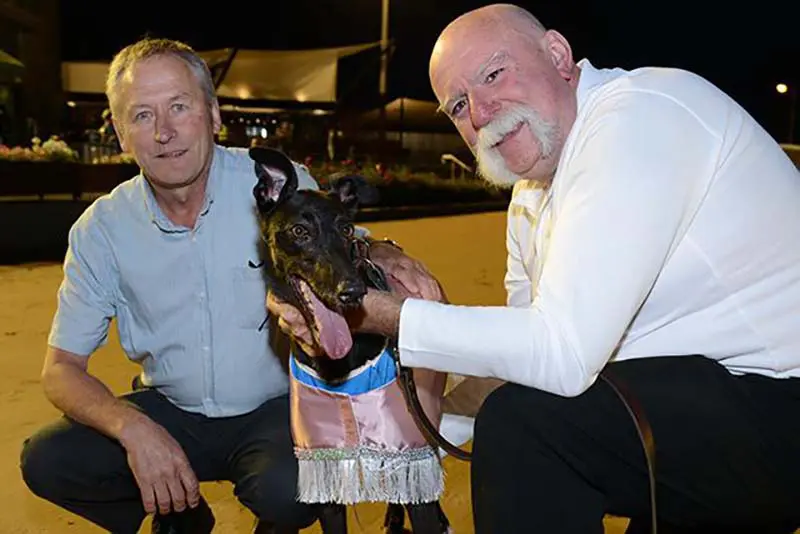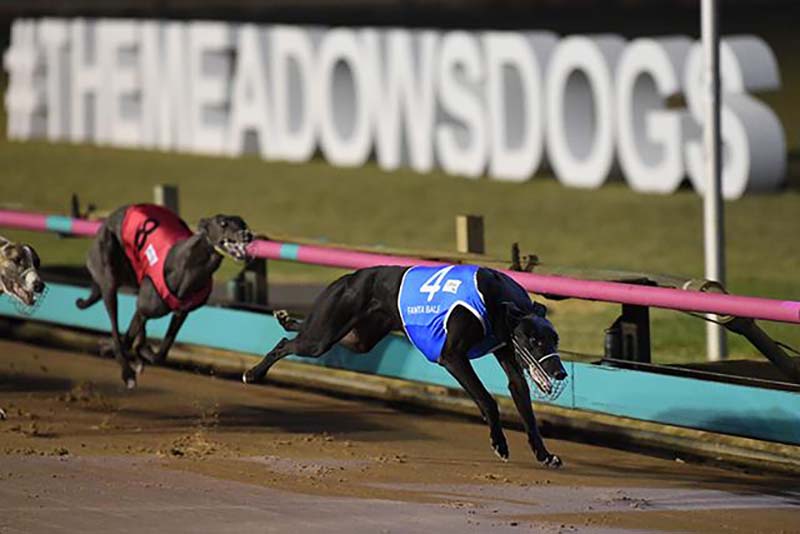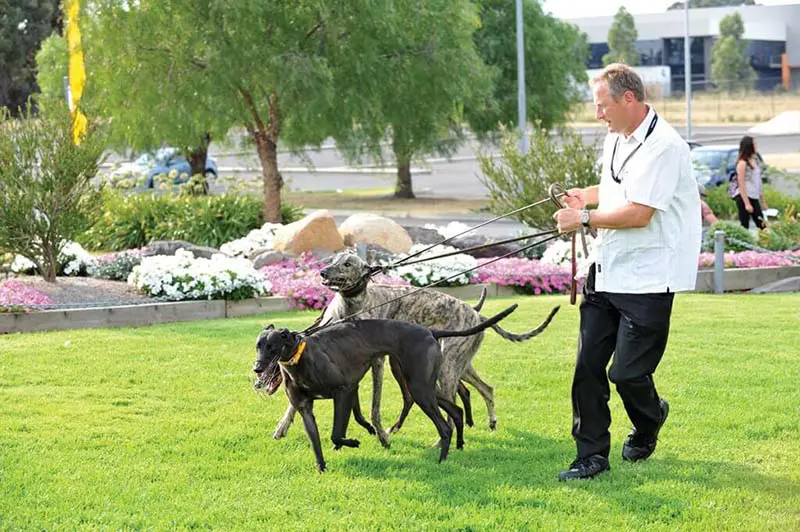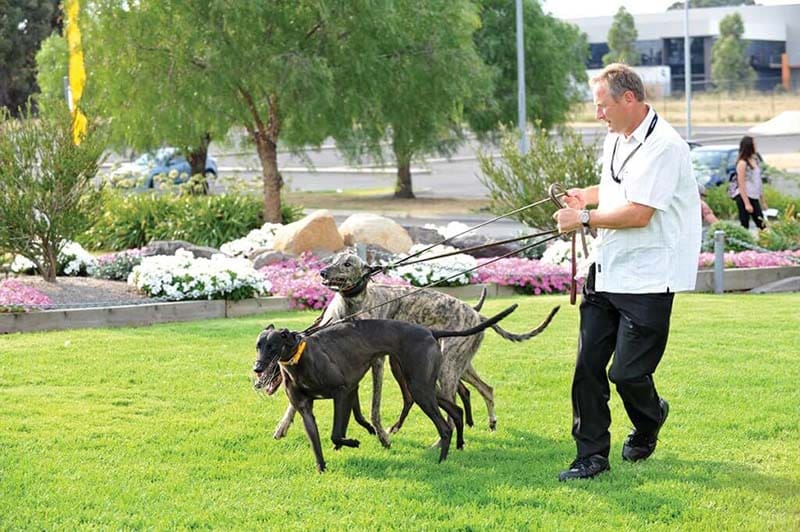Britton says demise of greyhounds in USA should serve as warning

Champion Victorian greyhound trainer Robert Britton has this chilling warning for those who think horse racing is safe – just look at what’s happening in Florida.
And this is constantly driving him as he looks to safeguard the future of dog racing in Australia in the face of relentless activism.
In what they believe preserves animal welfare, activists all over the country now want to see racing dogs stop doing what they are bred to do – and instead become domestic pets.
“They (horse-racing fans and participants) don’t realise it. I tell everyone if you don’t think horse racing isn’t in trouble, just Google ‘horse racing Florida’,” Britton told Australian Racing Greyhound.
“Since greyhound racing has died in Florida, they’ve started going after the horses. They’ll go after one thing and then another.”
Britton’s harrowing thoughts come after a trip to the US where he saw greyhound racing on its knees and on the verge of being completely shut down.
After a combination of relentless campaigns to have the sport outlawed and a lack of support from casinos, by the end of this year the “dishlickers” will go ahead at just two tracks in West Virginia.
It is a far cry from the glory days in the 1980s when there were more than 50 tracks across 19 states.
In a once thriving dog-racing mecca state of Florida, it was voter power that ended the sport at a dozen tracks last year.
In Iowa, state officials allowed casinos to end subsidies that had kept greyhound racing alive as broader interest declined.
“It’s absolutely devastating. It’s their livelihood over there,” said Britton, who attended a greyhound auction in Abilene, Kansas before selling one of his Konomi pups.
“I know people over there who are dog farmers and they’ve got nothing left – they’ve just given them away.
“It’s just so sad, but that’s the reality. There’s not much you can do about it.
“At its height of the auctions there were 800 dogs around the track for a week, and on Saturday they’d go in the auction ring.
“It dropped dramatically and now there are only 40-50 going through.”
It might be hard to believe for a foreigner in such a financially-powerful country where the opportunities for sports appear endless, but Britton believes the business models for racing in the US are broken.
“It’s more to do with the casinos not wanting greyhound racing than animal rights,” he said.
“I honestly believe horse racing over there is in grave danger as well for the same reason.
“The business model for greyhound and horse racing over there is hopeless in that it relies on people going to the track.
“We bet on our phones and on the TV – they haven’t gone to that level.
“What you find over there is the other entertainment options have taken over.
“The casinos only really wanted people going to the tracks.”
Like the way greyhound racing in New South Wales bounced back from the then-government’s announcement to have the sport shut down before its sensational backflip in 2016, Britton has seen the industry’s last remaining participants in the US put up a formidable final stand.
“In saying all that, with all the closures in Florida the prizemoney in Southland (Arkansas) – which will also close – is just phenomenal,” he said.
“They’re racing for US $13,000 for a top-grade race, which is $18-19,000 Australian.
“It’s crazy to think they’re going to close down when things are that good.
“And what it is – with Florida closing down, betting money is now concentrated on only two or three tracks.
“Hopefully with West Virginia still racing they’ll get a big bump as well.”
The National Greyhound Association auction in Abilene, Kansas, has been very good to Britton over the years.
It was a son of American dog Kelso’s Fusileer – Fernando Bale – who has probably had the biggest impact in Australia, becoming the country’s finest sprinter after winning eight Group 1 races and almost $1.3 million in prizemoney.
Fernando Bale has also become one of Australia’s premier sires, his offspring earning over $33 million since he joined the stud ranks in 2017.
Britton has also enjoyed considerable success with Fernando Bale progeny, particularly with champion stayer Tornado Tears.
He has also had success with American brood bitches, with Ucme Tycoon producing the country’s highest earning prizemoney winner, Fanta Bale.


That record of $1.365 million still stood by Wednesday night, with She’s A Pearl attempting to break it for Anthony and Jodie Lord, by winning the Good Odds Harada Cup Saturday free-for-all over 520m.
So it is no wonder that with all the success he’s had from American greyhounds, the severely weakened state of greyhound racing over there has also left Britton deeply saddened.
“The mother of Fanta Bale (Ucme Typhoon has been a revelation at stud). And SE’s High Above came out here and won a maiden in 29.50 at Sandown,” he said.
“She went back to America and produced good dogs for me.
“Over the years myself, Paul Wheeler and Geoff Collins have always concentrated on that auction.”
It is an auction which is dear to the heart of greyhound breeders and trainers in the US, and one which has made a massive positive impact across the Pacific Ocean.
“Geoff Collins had a Sydney Cup winner from that auction. I could go on and on from dogs who have come out of that auction because it’s a pure auction,” Britton said.
“A lot of auctions in Australia – people try to sell what they don’t want.
“But over there it was a pure auction.
“In Abilene, Kansas, it’s a dog and cow town. There are lots of dog farmers.
“They raise the pups and get them ready for the auction. Their Melbourne Cup for them is that auction.”
Because of what Britton has seen first-hand in the US across many trips over 20 years, he is now pleading with state greyhound racing governing bodies all across Australia not to make the same mistakes.
But in a chilling reality check for the sport, he is not optimistic that the sport can learn from what has happened in America, and the devastating effect it has had on thousands of former participants.
“It’s really sad. The biggest thing for me is our authorities have got to learn from it,” he said.
“What I’ve seen over 20 years in America comes to Australia into our system five to 10 years later.
“We need to learn from their mistakes, but I haven’t got great confidence in that.
“We don’t want to be making the same mistakes.”
So what can greyhound racing governing bodies do to ensure the sport’s longevity?
It’s all about creating a better image of the sport, according to Britton.
He is adamant that in such a highly-regulated industry, a lot more needs to be done to promote the many good welfare practices that conditioners all across Australia now have in place.
“We need to balance our argument against those who want to close us down,” Britton said.
“And we don’t do that. That’s our biggest issue.
“There was a study which said that in a particular year, 40 per cent of Victorians heard something about greyhound racing, and only four per cent of those have heard something good.
“That’s our biggest challenge.
“We need to balance the argument. By balancing the argument, we need to fight back and say ‘no, what you’re saying is wrong’.
“And basically put it out there that we’re doing nothing wrong.
“The problem is that our regulators don’t see that as their role.”
Britton believes that if greyhound racing wants to enjoy a prosperous future in Australia and not follow the perilous path it has taken in the US, the industry needs people with good intentions to make a collective stand.
That stance would involve fighting the many negative stereotypes which trainers and handlers continually put up with.
The top Victorian conditioner also said the sport’s authority figures need to be setting a better example for their very own marketplaces to follow.
“They (state greyhound governing bodies) are just crawling under the covers in my mind,” he said.
“They regulate and they do a good job with that, there’s no doubt there.
“But as far as promoting the industry and balancing the argument against the antis, we’re not doing that.
“Maybe it’s not up to our regulators to do that. But no one else is.
“When I go overseas they have things like farm visits. Communities go out to these farms and actually see the little puppies playing.
“We don’t do any of that as an industry. That needs to change. We need to be able to show the public that we’re not hiding anything and the dogs are really well treated.”
Britton also believes many greyhounds throughout Victoria are losing interest on race night.
He says they are not chasing with the same vigour of years gone by because they are no longer allowed to finish on the lure as a form of reward for their efforts.
“Dogs in Australia don’t chase like they used to. In Victoria in particular, we desperately need assistance in getting our dogs chasing,” Britton said.
“And by that I mean finishing on the lure.
“The integrity of the sport – with dogs just going round like clockwork and not really chasing – is a serious issue.”


Because Britton has such grave concerns about the future of greyhound racing in Australia, he is now trying to rally as many people as he can to join the Companions And Pets party.
Its charter mentions that it will always support an individual’s rights to own an animal and that person’s desire to pursue a chosen activity with that animal.
That could be as a pet, racing greyhound, thoroughbred racehorse, event horse, show dog, obedience or guide dog among other legal pursuits.
“You have a right as an owner to the quiet enjoyment of your animals without others seeking to deny you that right – we will work vigorously to uphold your rights,” the CAP says on its website.
Like greyhound racing in the US, this party might eventually peter out.
Or – like the resilience the sport has shown in West Virginia – it might help turn around the wider public’s perception regarding conditioners and how they treat their racing dogs.
“We’re running 16 candidates in the Victorian election based on fighting the antis,” Britton said.
“This might fizzle or it might go further, I don’t know.
“But I think these are the things we’ve got to be active with.”
Under an End Greyhound Racing header on the Animal Justice Party’s website, it states the following …
“In Victoria, gentle, docile greyhounds are being treated as nothing more than commodities to create gambling profits,” the statement says.
“There’s no denying that racing dogs die distressed, confused, panicked and in pain. It’s a brutal industry where the losers are the dogs – and they pay with their lives. “We must do all we can to end it now.”
However, Britton is proud to be a greyhound trainer, and that has included his animal welfare processes in the way he has treated his dogs over many years in the game.
He says a vast majority of fellow conditioners treat their greyhounds with the utmost respect, while the rogue trainers – in a minority – have been dealt with, and will continue to be dealt with.
This is why he is so passionate about fighting the way his industry is portrayed by anti-greyhound racing activist groups.
“The Animal Justice People puts out fluffy little photos of pets and people vote for them,” he said.
“This year they got rid of carriage horses (in Melbourne) and it was all to do with the Animal Justice Party.
“They’re just extremists and we’ve got to expose that.”